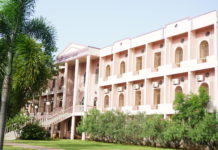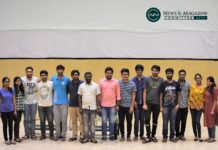The Academic Secretary of the Students’ Council 2018-19, Mr. Meer Afroz sat down with us at the NMC to discuss his performance in the odd semester.
Afroz’s motivation for contesting was his passion to help the students. “Since 4 years, I’ve always been contesting. I didn’t want to be among the crowd who are complaining. I wanted to be among the crowd who solve the problems,” he added. His reason for choosing academics over other portfolios was the significance it held for students and their parents when they chose NIT Warangal over other colleges. He further explained, “When a student comes to college, the main perspective in their minds is academics. Academics is an integral part of NITW, which is why I wanted to be the one representing it.” Afroz’s vision as the academic secretary is to improve the research scenario in the campus and shift the focus onto students’ overall development by incorporating reforms in the marks centric approach followed by the professors. Apart from his vision, he also hopes students come forward and raise relevant academic issues and problems with faculty, subjects etc. On a humorous note Afroz added, “Academic secretary is there to address your academic problems, not your academic attendance.”
One of the major differences this year when it comes to elections was the lack of a manifesto. None of the candidates released what could have arguably been the easiest method to hold them accountable. Students could have judged the work done by the council both qualitatively and quantitatively with respect to their manifesto points. Meer Afroz’s reply on not releasing a manifesto was lack of time due to the change in the election system along with the issue of TnP cell. Afroz further explained, “I also didn’t want to reveal my choice of portfolio by releasing a manifesto as a political strategy to avoid other people trying to keep me from getting my position.” Another reason for Afroz not releasing a manifesto was the lesson learnt from the previous Council’s inability to deliver on their lofty manifesto promises. “We also had to keep in mind that our manifesto doesn’t get us kicked out like it did for the previous SC,” he added.
On being asked why he didn’t release one after winning the elections, Afroz replied that he was faced with the pressing issue of over 200 undispatched degrees of the graduated students and also had to stabilize the Council while figuring out the division of responsibilities under the new system. “Hence, it didn’t come to my mind that I needed to make a systematic, propagandic plan for the year.”, he added. It was surprising to listen to Afroz refer to a manifesto as a propagandic plan. He also explained how several long term manifesto points cannot be accomplished since it’s the responsibility of the next Council to follow up on the representations made which cannot be ensured by the current secretaries once they’ve graduated. Unlike his counterparts, Afroz adamantly refused to release a manifesto for the next semester unless the entire Council agreed to release it. Afroz concluded by saying, “By keeping a manifesto, you are asking us to put up new initiatives, which are new, even to the student body. We don’t want our success to be calculated using a percentage success ratio on the basis of number of manifesto points that we’ve completed. We just want to be known for helping the students.”
Moving on to his achievements, Afroz mentioned that the problem of undispatched degrees has been resolved with only around 11 degrees pending at the time of this interview. The disbursement of academic caution deposit was completed in the first semester itself unlike previous years where it was done in the second semester. Reading rooms with proper chairs and tables have been opened in 1K and 1.8K hostels. Afroz has also submitted a representation for AC in the reading rooms which hasn’t been accepted yet due to the possibility of misuse and lack of a proper monitoring system. Reading rooms to be implemented in library once the tender process for the sale of newspapers currently present in the rooms is completed. Afroz wasn’t sure whether this can be implemented in the even semester since the time taken for the processing of a tender is indefinite and depends on the Admin’s decision. He promised that the library reading rooms issue will be resolved immediately after the tender is processed. The system of disbursement of Mtech stipends has been formalized after an informal representation requesting a deadline (26th of every month) for all departments to send list of eligible students to the accounts section. The SC/ST fee waiver for the current final year students was restituted after a formal representation to the Registrar and Director sir. As an initiative to encourage research, registration and travel expenses of a student presenting a research paper will be funded by the college.
“Online Registration is our biggest achievement in the odd semester,” Afroz added proudly. The Council worked for over three months to make this initiative a reality. (At the time of this interview, online registration for the even semester had been accepted by Admin. But recently the decision was revoked and offline registration with a one day extension was followed.) Although Afroz was sure online registration would be successful, he also added, “In case it doesn’t work, I will learn from my mistakes because that is my attitude and I’ll advise my juniors. We will stand with the students in case there is an issue.” Despite his promises, the Council failed to get the registration dates extended beyond December 31st. The representation requesting the late registration fine to be reduced in view of the Council’s online registration debacle was also not accepted.
Moving on to his other failures, he mentioned that most of the works taken by him are in an ongoing stage. So he was not able to provide any such distinctive failures. Considering that failures are an important part of learning, we feel that is where he missed out.
Afroz also commented on the lack of a visionary in the current third year batch. This was extremely surprising considering the fact that he works with four deputy secretaries and is an insight into his opinion of them. Afroz also added, “I want to urge students to take part in the Student Council. I’m here to teach you the work if you’re willing to learn and are interested in contesting next year.” It’s slightly ironic for Afroz to throw around the buzzword visionary so much, considering his counterparts in the Council and the work done by the SC in the odd semester.
Plans for next semester:
(This being a rough plan, we hope that Mr. Meer Afroz releases a detailed PoA despite his obstinate refusal at the beginning of this interview.)
- Incorporate greater training aspects in TnP cell
- Formalize the intern talks of the various branch associations through TnP platform
- Organize mock placements and interviews
- Guest lectures by motivational tech personalities and entrepreneurs.
- One Credit project system
Students doing major research work or projects under any faculty, either in campus or in other institutes and internships to be awarded one credit for the work done. Afroz believes this will be an incentive for students to take up research opportunities.
- Interactive sessions with PhD scholars
In order to imbibe research culture among the students of Btech program, Afroz plans to have interactive sessions with the PhD scholars to to help and guide the interested Btech students in the research domain of their respective branches.
- Change in the MBA Quarterly system.
Afroz has represented for a semester or tri-quarterly system followed in major B-schools in order to make the schedule of MBA students less hectic. The decision is pending in the Senate and he hopes the next year’s Council will follow up on this issue.
- Changes in the feedback system
Afroz initially did not mention his plans for the feedback system which reflects its priority in his even semester PoA. On being reminded, he explained that he plans on getting the number of markers which are part of the criteria and the fine (currently Rs 500) reduced.
Surprisingly, Afroz did not mention his stance on the convocation attire and whether he plans on making any changes to it.
To conclude, Meer Afroz considers his performance as the Academic Secretary to be “much better” than the work done for Academics by the previous Students’ Council. Afroz also made a quip on how he was the one who completed the manifesto point of online registration of the previous SC President. With this statement no longer applicable, it’s up to the students to decide whether Afroz’s performance was “much better” or underwhelming when compared to the previous year’s Students’ Council. (No pun intended) Personally, he is satisfied with his performance. On being asked to rate his work for the odd semester on a scale of 1-10, Afroz replied, “I would rate myself around 8.”
Disclaimer: This interview was conducted before the online registration debacle.





